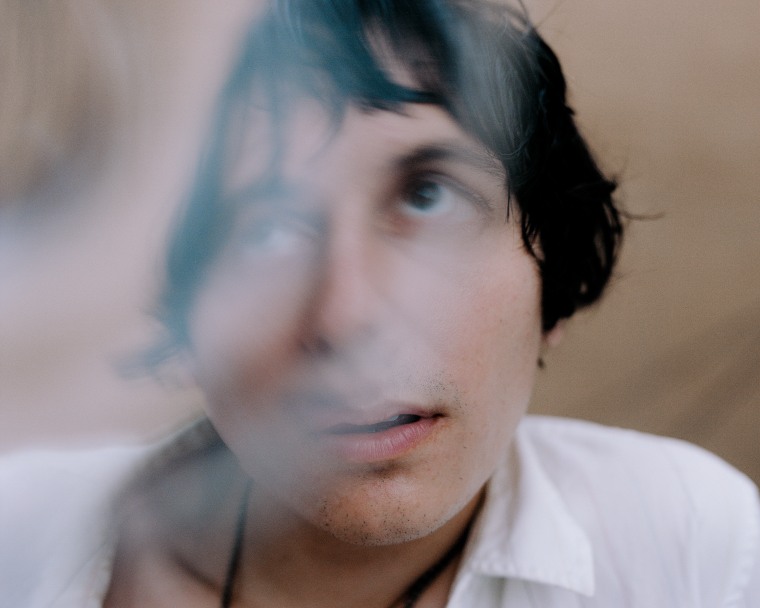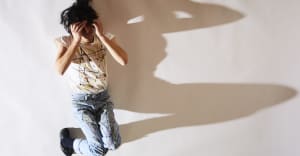 Photo: Michael Wolever
Photo: Michael Wolever
Singer-songwriter Sean Henry left New York City about a year ago to return to sleepy, suburban Connecticut, where he grew up. It was, he says, a practical concern as much as anything else — a break-up, a lack of money, and the relentless pace of the city all drove him away — but he got settled into the slower pace of his hometown pretty easily. I can hear that over the phone, with Henry taking a couple of mellow seconds to answer every question and speaking mercifully slower than anyone I've encountered in New York City this month. But the real proof is on his third LP, A Jump From The High Dive, premiering in full below ahead of its release on Friday via Double Double Whammy.
A Jump From The High Dive is a perfect slice of throwback slacker alt-rock, the sound of a slowly twisting radio dial in 1996. It leads with its melodies, all of which are engineered to burrow into your brain, but it will leap off into shameless funk breakdowns and pop-rock riffs at a moment's notice. Henry loads every song up with snarling, straightforward one-liners (Lived in New York City / Everyone’s a jerk," he sings on opener "Can U") and blurry snapshots of a life outside of the buzz ("Two lovers at the townie bar / Just a baseball game and a VCR" on the fuzzy "Surf Song.")
Henry really thrives when he slows all the way down though, first on the almost uncannily bright single "Rain, Rain," then on the whisper-quiet, pitch-black "If," where he sings: "Everything’s going away / A little bit, day by day / Everything’s going away." Over text after our interview, I asked Henry what mood he was trying to strike with the song. "Melancholy yet indifferent," he wrote back Like giving a hug to someone before leaving indefinitely. Recorded on a foggy and rainy ides of march this year."
Read our interview and listen to A Jump from the High Dive below.
When did you leave New York?
I left New York a little over a year ago. I was going back and forth this past year — living there a few months and then coming back. But I was working on this album up in Connecticut in my friend's studio, who plays in my band. It's where I'm from originally.
What made you want to leave?
My living situation ended — I was living with my partner at the time and we broke up. So I just moved out. I'd just gotten back from a tour, so I decided to go home. It's either New York or Connecticut for me, but I was running low on cash, so I went straight home. I released my last album at the same time, and I started making the new one pretty much right after it. It's a good spot up here — life's a bit quieter. I was able to sink into making something new.
What impact do you think Connecticut's quiet has had on your process?
Coming back, I was able to connect with growing up here. I could go through that again, revisit my childhood. The people up here have been a huge inspiration on this album. People get stuck up here — it's a townie lifestyle, life moves a bit slower. People don't think about things the same way. I was reconnecting with that, and with old friends.
Music up here is a small, loyal scene, and I reconnected with that. I wasn't working at the time, I was crashing on my friend's couch and living at my grandma's house, and I was just writing every day, thinking about what I wanted this record to sound like. It was the only thing I had to think about for six months. I was lucky to have that opportunity, and I wasn't able to do that in New York. There are other things that inspire me about New York City — it's probably my favorite place on earth — but life is tough down there. I was working and running around a lot. It's hard to find some quiet time to focus on your craft sometimes.
Was it a difficult readjustment?
It took me a long time to slow down. It chills me out a bunch. I became a lot more relaxed, caught up with a slower pace. I had to see what my friends do up here — where the shows are at, what people are up to. It took some time. A lot of times, there's not a lot to do up here — I wasn't really doing anything, just watching TV.
You seemed to change your listening habits when you moved home as well, listening to a load of alt-rock and '90s hip-hop.
I took some real time to study that era specifically, and I was listening to things I'd never thought I'd get into: Oasis, Radiohead, Red Hot Chili Peppers, The Cranberries, Björk. That was my zone. I still wanted to make a modern pop record though — at least, my version of one.
What do you think makes this a pop record?
I wanted to make something that was listenable for anybody. Me and [Brian Antonucci], who produced the record with me, focused on the production more — finding more of a polished sound, getting good tones, guitar sounds, drum sounds. We spent weeks figuring that out for ourselves. I wanted something that had an immediacy that could get stuck in your head and you'd want to listen to again. Those are my favorite records.
Is your main priority getting people to come back for the melodies?
That's one of the major elements. I also tried to dissect the songs more and spend more time on each tiny part — on what I wanted to say on each song, how they feel when you listen to them. What really ties that all together is the drums. A lot of those '90s songs had a bop to them.
There's also noise on pretty much all of the songs. We'd record ambient noises sitting underneath the tracks — guitars, feedback, loops, delays. They're there as a cushion. It came naturally, but it's also inspired by lo-fi recordings and noise recordings, which I used to do on my early albums when I used to record in my room. Also, early Wilco albums — there's a lot of layers there.
The core melody in "Rain, Rain" is something you've said you've had kicking around your head since you were a child — though it seems a little dark.
For me, it was positive. It all started when I was younger during baseball games. I didn't want to go play, I just wanted to stay home, so I'd hope that it would get rained out. It was just cancelling the day. I wanted a rain day like I wanted a snow day. It wasn't a negative thing. I just wanted some time to myself. That melody just stuck with me, and singing it that way always just stuck with me. I guess it's a little dark — but it's also funny to me. There's a few songs like that — on "Touch The Sun, the melody in the chorus had been sticking with me for a long time: "I wanna touch the sun / But i really can’t / If i try, I will surely die." That was stuck in my head forever, I was just waiting for the right time to record it.
